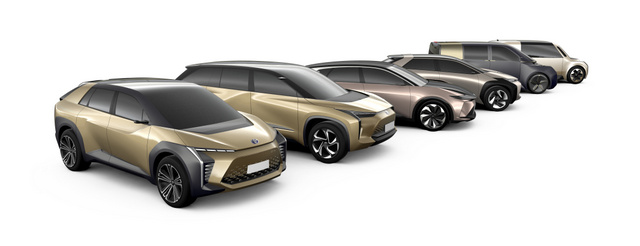Japanese Companies Expand Working Relationship
Battery electric vehicles are more expensive to develop and produce than conventional internal combustion engine vehicles. That’s a fact reinforced by Tesla’s ongoing deficits and the reluctant (but huge) investments major automakers are making to move to EVs. How do you tackle these challenges? Work together to share costs. Toyota, one of the world’s largest automakers, and Subaru, one of the smaller ones, this week announced they will work together on a new EV platform.

That’s not all that Toyota moved on last week as the company also announced it was partnering with Contemporary Amperex Technology Ltd. (CATL) of China, the world’s largest automotive battery maker, in order to diversify its supply chain for those future EVs. The wide-ranging partnership will also include BYD of China and Toshiba and GS Yuasa of Japan, three major players in the battery space.
In sum those moves position Toyota to be able to compete with the ambitions of Volkswagen and other automakers who have laid out aggressive plans of electrification. Several of the battery companies Toyota is working with also work with other auto companies.
More Toyota-Subarus
The EV collaboration with Subaru, in which Toyota has a 16 percent ownership stake, is an extension of the two companies existing working relationship, which has produced the Subaru BRZ/Toyota 86 sports car and some of the components for the recently introduced Subaru Crosstrek plug-in hybrid.

This new project will develop a EV-dedicated platform for midsize and large vehicles that will incorporate Subaru’s all-wheel drive technology with Toyota’s electrification technologies. The first product is expected to be a compact SUV that each company will market under their own brands.

As Toyota and Subaru noted in their joint release, this is all about speed to market and developing products for different markets. The platform will be able to accommodate C-segment (compact) and D-segment (midsize) sedans and SUVs as well as variations on those basic models. Subaru’s electrification efforts will be subsumed within this joint project while it appears that Toyota, because of its size, will be pursuing other projects for smaller EVs that may appeal primarily to Asian markets. In total, they represent a substantial increase in Toyota’s attention to the battery electric vehicle market. In the past the company has indicated it felt fuel cell electric vehicles (FCEV) were the preferred zero emission technology, and they continue to pursue projects with that technology.

Make sure to opt-in to the Clean Fleet Report newsletter (top right of page) to be notified of all new stories and vehicle reviews.
Related Stories You Might Enjoy—Toyota-Subaru JV Vehicles & Toyota Technology Ventures
Road Test: 2019 Subaru Crosstrek Hybrid
Road Test: 2018 Toyota 86
News: Toyota Fuel Cell Heavy-Duty Trucks
Road Test: 2019 Toyota Mirai FCEV
